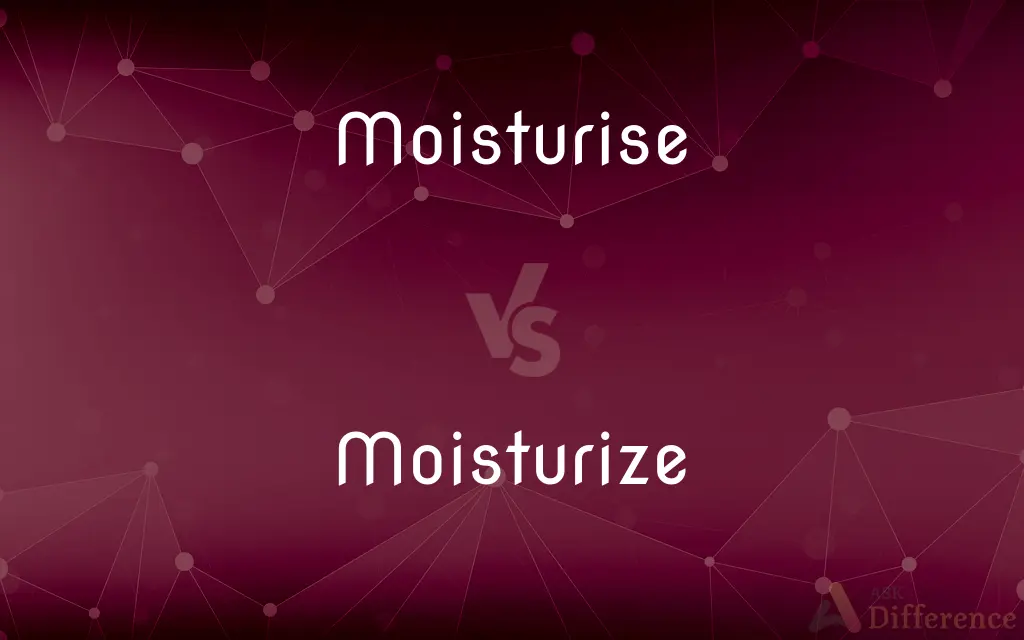Moisturise vs. Moisturize — What's the Difference?
By Fiza Rafique & Urooj Arif — Updated on April 4, 2024
Moisturise and moisturize refer to the same process of making something moist, with the former used in British English and the latter in American English.

Difference Between Moisturise and Moisturize
Table of Contents
ADVERTISEMENT
Key Differences
"Moisturise" is the spelling commonly used in British English, referring to the act of applying a moisturizer to the skin to prevent dryness. "Moisturize," on the other hand, is the American English spelling for the same action, highlighting a regional preference in the English language.
Both terms are used in the context of skincare and beauty, with "moisturise" often appearing on products and in literature outside the United States. Whereas "moisturize" is predominantly seen in American publications and product labels, reflecting the American English convention.
The choice between "moisturise" and "moisturize" can also reflect an audience's location or the writer's adherence to either British or American English standards. While "moisturize" is preferred in American English, international audiences might be more familiar with "moisturise."
Despite the difference in spelling, the action and intention behind both words are identical. They both denote the process of making something, especially the skin, more moist, usually by applying a lotion or cream.
In professional settings, such as in dermatology or cosmetics, the choice of term may align with the regional language preference, but it does not affect the understanding or the science behind skin hydration. Both terms communicate the importance of maintaining skin moisture for health and cosmetic reasons.
ADVERTISEMENT
Comparison Chart
Spelling
British English
American English
Usage Context
Common in the UK and Commonwealth countries
Predominant in the United States
Audience
Aimed at those familiar with British English norms
Aimed at an American English-speaking audience
Appearance in Texts
Beauty and skincare publications outside the US
American publications and product labels
Semantic Difference
None
None
Compare with Definitions
Moisturise
To make something slightly wet.
I moisturise my face daily to keep the skin soft.
Moisturize
To apply a moisturizer to the body.
Moisturize your legs to soothe dry skin.
Moisturise
Applying a lotion or cream.
Moisturise your hands regularly to prevent dryness.
Moisturize
Making the skin less dry.
Moisturize frequently in winter to avoid chapped hands.
Moisturise
Act of preventing dryness.
Moisturise the air with a humidifier in dry climates.
Moisturize
Preventing dehydration of the skin.
Moisturize to keep your skin hydrated throughout the day.
Moisturise
To add moisture to.
It's important to moisturise after every shower.
Moisturize
To add moisture to an area.
Use this product to moisturize dry patches on your face.
Moisturise
A skincare routine step.
Cleansing, toning, and moisturising are key for healthy skin.
Moisturize
Part of a daily beauty regimen.
Always moisturize before applying makeup.
Moisturise
Alternative spelling of moisturize
Moisturize
To add or restore moisture to
Lotion that moisturizes the face.
Moisturise
Make (more) humid;
We have a machine that humidifies the air in the house
Moisturize
(transitive) To make more moist.
Moisturize
(transitive) To make more humid.
Moisturize
Make (more) humid;
We have a machine that humidifies the air in the house
Common Curiosities
Is the product effectiveness different if labeled "moisturise" vs. "moisturize"?
No, the effectiveness is not affected by the spelling of the word on the product label.
Can I use moisturise in American English?
While understandable, it's less common and may be marked as a spelling error in American English contexts.
Why do British and American English have different spellings for the same word?
The differences have evolved over time due to cultural, historical, and linguistic influences, leading to variations in spelling.
How do I know which spelling to use?
Use "moisturise" for British English audiences and "moisturize" for American English audiences.
Does the spelling vary in scientific contexts?
In scientific contexts, the preferred spelling aligns with the publication's language standard, either British or American English.
Are there any other words with similar British and American English spelling differences?
Yes, such as "organise" vs. "organize" and "realise" vs. "realize."
Is there a difference between moisturise and moisturize?
No, they mean the same thing but are spelled differently in British and American English.
Why do some countries prefer British English over American English?
This preference often stems from historical ties, education systems, and cultural influences.
Will using the wrong version affect my writing's reception?
It could, depending on the audience's familiarity with British or American English norms.
Is one spelling more correct than the other?
No, both spellings are correct within their respective dialects of English.
Can software correct the spelling based on English preference?
Yes, most spell-checking software can adjust for British or American English spelling preferences.
Are there any exceptions to these spelling rules?
Exceptions can occur in personal names or brand names, where the chosen spelling must be respected.
Do Canadians use "moisturise" or "moisturize"?
Canadians generally use "moisturize," aligning more closely with American English spelling conventions.
How can I remember which spelling to use?
Remembering the audience or region you're writing for can help decide the correct spelling.
Does the internet prefer one spelling over the other?
Online usage tends to mirror the global presence of American media, making "moisturize" more commonly seen on international platforms.
Share Your Discovery

Previous Comparison
Big vs. Great
Next Comparison
Logo vs. InsigniaAuthor Spotlight
Written by
Fiza RafiqueFiza Rafique is a skilled content writer at AskDifference.com, where she meticulously refines and enhances written pieces. Drawing from her vast editorial expertise, Fiza ensures clarity, accuracy, and precision in every article. Passionate about language, she continually seeks to elevate the quality of content for readers worldwide.
Co-written by
Urooj ArifUrooj is a skilled content writer at Ask Difference, known for her exceptional ability to simplify complex topics into engaging and informative content. With a passion for research and a flair for clear, concise writing, she consistently delivers articles that resonate with our diverse audience.
















































